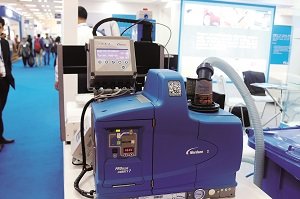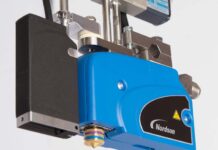The primary business of Nordson Corporation is the precision dispensing of fluids. At Indiapack/pacprocess, the company displayed equipment for the precision dispensing of hot melt adhesives (HMA). These are adhesives that are applied in a molten state. With a backbone of a thermoplastic polymer, the HMA melts at elevated temperatures and turns solid at normal ambient temperatures.
The company has been in the Indian market for around 29 years. As demand for high quality consumer products has surged and as competition has intensified, manufacturers of consumer goods are now required to deliver consistent quality, at a faster rate and at the lowest cost. HMAs do a great job of this, but they do suffer from a few problems.

One major problems Indian users of HMA have faced has been the blockage of nozzles. “Nozzles get blocked because of contaminants that get lodged in them,” said Suprotik Das, managing director, Nordson India. This could happen due to contaminants external to the equipment, such as dust in the factory environment, or internal contamination, caused by charring of the adhesive. The ‘melt on demand’ technology displayed by Nordson is one means of overcoming charring. The technology significantly reduces the time for which the adhesive sits at high temperature. A traditional tank melter would have a minimum capacity of 4 liters. This could result in the HMA being held at an elevated temperature for several hours, increasing the possibility of charring.
The machine displayed by Nordson has no tank at all. Instead, melting is achieved in a small grid of less than 0.4 liter capacity. Consequently, the adhesive is exposed to high temperatures for a very short period of time, virtually eliminating the possibility of charring.
The machine is also equipped with an automatic fill system and a level sensor in the gird. The latter senses the quantity of molten adhesive in the grid and, when the level falls, it automatically adds material to the grid from a large bin. This minimizes the chances of any external contamination entering the system.
A blocked or partially blocked nozzle always results in defective products and adds significant costs to the manufacturer. The technology demonstrated virtually eliminates this. Modern manufacturing managers are deeply concerned with the reliability of their processes. The second technology displayed by Nordson was an Adhesive Tracking System (ATS) that vastly improves process reliability. The ATS enables a manufacturer to specify the amount of adhesive required per product. It tracks the quantity on each product and sets off an alarm if the customer-set limits are breached.











